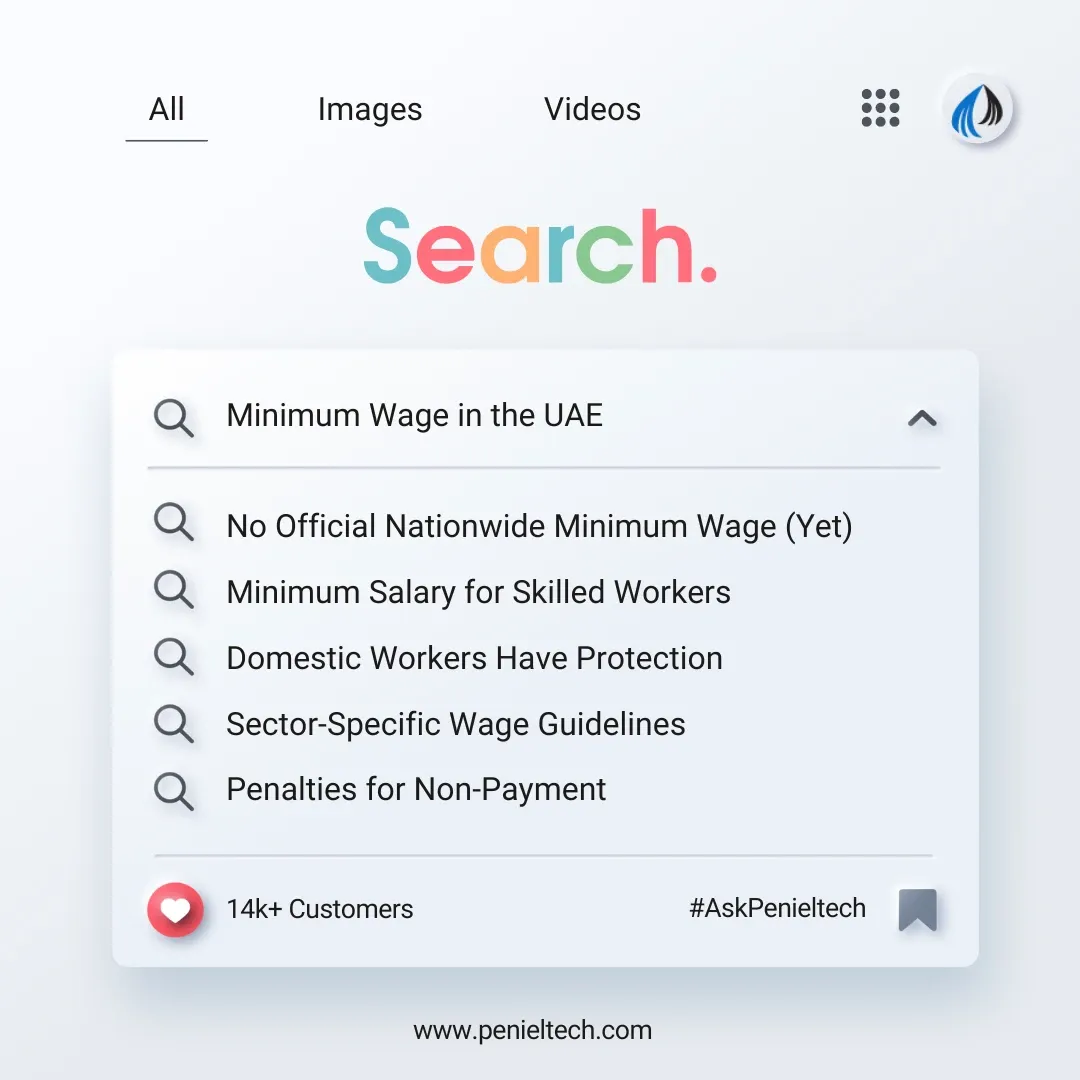For employers, HR teams, and anyone trying to make sense of the current salary system in the UAE
Wages. In most places, the word comes with a number - a legal minimum that guarantees some level of fairness. It’s like a promise from the government that says, “You can’t pay less than this.” But here in the UAE, the landscape isn’t quite that simple. Sometimes it can be way too confusing to understand how wages work here. Well, that’s the reason we’re here today.
It is really important to know that the UAE doesn’t have an official minimum wage for all workers. There’s no single amount printed in law books and no official baseline stamped into every employment contract. But that doesn’t mean there’s no structure - or that workers are left without protection.
Wages in the UAE run on a system built around contracts, legal oversight, and accountability. And while the term “minimum wage” might not carry legal weight here, there’s still a way it functions, just not in the way most expect.
Today, we’ll unpack the full picture, including what wages actually look like in 2025, how the system protects employees even without a fixed minimum, and how payroll and HR tools keep everything on track.
What is Minimum Wage?
At its simplest, a minimum wage is the lowest amount of money a worker can legally be paid. It’s a rule, one that’s designed to stop employers from underpaying.
What is the Minimum Wage in the UAE in 2025?
Here’s where the UAE takes a different route.
Even in 2025, the UAE hasn’t introduced a national minimum wage in the UAE. There’s no legal figure that applies to everyone.
Instead, salaries are agreed upon in writing, through a formal employment contract. That contract is submitted to, and must be approved by, the Ministry of Human Resources and Emiratisation (
MOHRE). Once approved, it becomes legally binding.
That’s how minimum wage operates here: not as a national number, but as a legal promise.
What is the Average Wage in the UAE in 2025?
So, if there’s no legal “minimum”, what does “normal” even look like?
That’s where average wages help us understand how the system works there. In 2025, salaries in the UAE still vary depending on job type, industry, qualifications, and, of course, location.
Years ago (2013), the Ministry of Labour shared non-binding salary suggestions based on job categories and educational background.
Here’s what those looked like:
- University graduates - AED 12,000/month
- Skilled technicians - AED 7,000/month
- Skilled laborers - AED 5,000/month
Other Categories:
- Domestic workers, janitors, drivers, and general laborers - AED 1,500–5,000/month (Unskilled or Semi-skilled workers).
- Marketing managers, accountants, and others - AED 10,000–25,000/month (Mid-level professionals).
- IT specialists, engineers, doctors, etc. - AED 20,000–45,000/month (Skilled professionals).
One key factor: where you work. A job in Dubai usually pays more than the same job in Fujairah, not because the job changes, but because the cost of living does.
So, in the absence of a national minimum wage, these averages offer context. They’re the map workers and HR teams use to set expectations.
Factors Affecting Wage Levels in the UAE
Wages in the UAE aren’t picked randomly out of thin air. Several factors shape how much a person should earn. However, these factors go beyond just the job title.
- Job Type and Industry
Some sectors in the UAE usually pay more. Sectors like construction and hospitality tend to offer lower wages, while
finance,
IT, healthcare, and engineering often pay significantly higher, especially for niche skill sets.
- Skill Level
Naturally, technical skills and certifications impact earning potential here. If you hold a university degree or a professional certificate, then it can push your salary up. For example, a licensed technician earns far more than an entry-level warehouse worker.
- Location
A worker in Abu Dhabi or Dubai may earn more than someone doing the same job in Ras Al Khaimah or other emirates. It happens mostly because the cost of rent, transport, and even groceries vary across emirates.
- Economic Conditions
Apart from the others, there is another thing that matters the most - economic conditions, including the GDP growth.
Wage Protection Laws and Systems in the UAE
People often ask a common question when it comes to wages and the UAE. In a country without a fixed minimum wage, how do you make sure workers still get paid fairly? Here things get interesting. Even without an official minimum wage, the UAE has one of the most digitally regulated salary systems in the region - the Wage Protection System (WPS).
WPS is basically a digital platform developed by the MOHRE and the
Central Bank in the UAE. It ensures employees in the private sector are paid exactly what they’re owed, and on time.
Here’s how it works
- Most importantly, it’s mandatory for companies to register with WPS. They can do it through financial institutions or authorized banks.
- As the next step, they need to (employers) upload salary data (Salary Information Files) to their bank.
- The bank transfers the wages to the employees’ accounts and processes the salary files through the system.
- Here comes the final part. The MOHRE checks that wages match the official contracts to ensure compliance.
If something’s off, underpayment, late payment, or missing salaries, the system flags it.
What Happens If a Company Fails to Comply?
There are serious consequences:
- Suspension of new work permits
- Blacklisting (which damages reputation and restricts operations)
How to Pay Wages to Your Employees in the UAE
If you’re an employer in the UAE, paying staff here is all about meeting legal, ethical, and operational standards.
Here’s the right way to do it:
- Define salary clearly in the contract, including benefits, allowances, and deductions.
- Now get MOHRE approval and use WPS-compliant channels. Remember, all contracts must be registered and approved.
- During the entire process, it’s salient to use a payroll software that can handle all calculations effortlessly and provide payslips.
- Always stick to agreed contract terms. What’s filed with MOHRE is what must be paid. Nothing less.
- Stick to payment deadlines because late salaries can mean legal trouble.
- At the end, don’t forget to issue payslips that show all the salary breakdowns and deductions.
Future of Minimum Wage in the UAE
Now the question is, “What might the future of minimum wage look like in the UAE?”
Well, it’s a fair question, but hard to answer. The UAE continues to balance business-friendliness with worker protection. Introducing a fixed national wage could shift that balance.
For now, the contract-based system stays, backed by WPS and monitored through strict compliance.
But conversations are going on. Worker welfare has become more central in the region’s economic planning, and as the labour market matures, especially with the rise of skilled expats and freelancers, expectations may shift.
Until then, the system continues as it is.
FAQs
People often ask these questions:
- If I get paid late. Is that normal?
Your company has a deadline, and the government watches this stuff closely through WPS. If your salary is late or short, the system flags it.
- Can My Employer Cut My Salary Without Any Proper Reason?
No, they can’t do that at all. They’ll need your permission, in case they want to change anything, and it has to go through proper legal steps.
- I’ve seen people doing the same job in Dubai earning more. Why is that?
Dubai, Abu Dhabi, and other bigger cities generally pay more because living there is more expensive. So companies often bump up the salary a bit higher.
- Is there a fixed minimum salary in the UAE, like in other countries?
No, there's no government-declared number that says “this is the minimum salary for everyone.” What actually matters here is your contract.
- Will the UAE ever set a national minimum wage?
Maybe because things are changing. Worker rights are being talked about more, and other Gulf countries are making moves too. So yeah, it might happen. For now, though, your contract is still the main thing that decides your pay.

